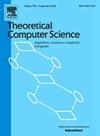二叉树的简洁编码及其在AVL树中的应用
IF 1
4区 计算机科学
Q3 COMPUTER SCIENCE, THEORY & METHODS
引用次数: 0
摘要
我们使用一种新颖的分解来创建简洁的数据结构——支持在恒定时间内对静态树进行广泛的操作——用于各种树类,扩展了Munro、Nicholson、Benkner和Wild的结果。在AVL树类的激励下,我们进一步导出了存储生成函数满足某些函数方程的树类所需比特数的信息理论下界的渐近性。特别是,我们证明了AVL树每个节点大约需要0.938比特来编码。本文章由计算机程序翻译,如有差异,请以英文原文为准。
Succinct encodings of binary trees with application to AVL trees
We use a novel decomposition to create succinct data structures – supporting a wide range of operations on static trees in constant time – for a variety tree classes, extending results of Munro, Nicholson, Benkner, and Wild. Motivated by the class of AVL trees, we further derive asymptotics for the information-theoretic lower bound on the number of bits needed to store tree classes whose generating functions satisfy certain functional equations. In particular, we prove that AVL trees require approximately 0.938 bits per node to encode.
求助全文
通过发布文献求助,成功后即可免费获取论文全文。
去求助
来源期刊

Theoretical Computer Science
工程技术-计算机:理论方法
CiteScore
2.60
自引率
18.20%
发文量
471
审稿时长
12.6 months
期刊介绍:
Theoretical Computer Science is mathematical and abstract in spirit, but it derives its motivation from practical and everyday computation. Its aim is to understand the nature of computation and, as a consequence of this understanding, provide more efficient methodologies. All papers introducing or studying mathematical, logic and formal concepts and methods are welcome, provided that their motivation is clearly drawn from the field of computing.
 求助内容:
求助内容: 应助结果提醒方式:
应助结果提醒方式:


